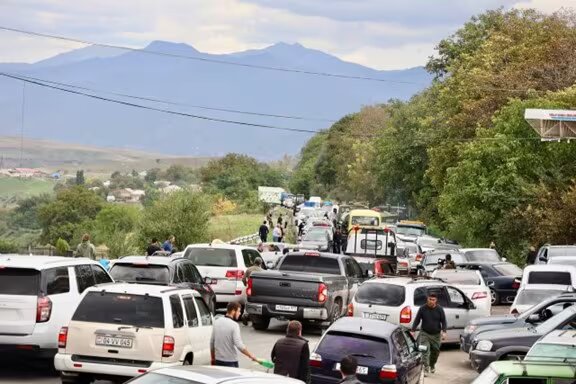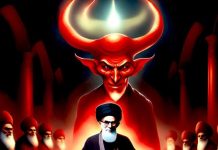تدريجيًا ثم فجأة: دروس آرتساخ للضحايا والمعتدين المحتملين
السفير. ألبرتو م. فرنانديز/ميمري/28 أيلول/2023 (ترجمة موقع غوغل)
Gradually And Then Suddenly: Artsakh’s Lessons For Potential Victims And Victimizers
Amb. Alberto M. Fernandez/MEMRI/September 28, 2023
South Caucasus | MEMRI Daily Brief No. 527
It would be easy to say that Azerbaijan’s corrupt, blustering dictator Ilham Aliyev has outsmarted and outplayed the Biden Administration and the leadership of the European Union. But that is not the whole truth. The truth is that they wanted to be played when it came to the inconvenient existence of the Armenians of Nagorno-Karabakh. It is a problem they wished would go away. An ancient Christian people living for centuries in their mountainous homeland, they were placed within the borders of the Azerbaijan Soviet Socialist Republic by then Soviet Commissar for Nationalities Joseph Stalin in 1923.[1] Once the Soviet Union cracked up, those borders were largely treated as sacrosanct by the international community. As of late September 2023, it seems that the survival of the Armenians of Artsakh (as they called their homeland) has been extinguished by the Aliyev regime after nine months of increasing hunger and suffering followed by a short but bloody invasion.
But beyond the very real ethnic cleansing of Karabakh’s Armenians, under the very noses of the US, EU and UN, what are the implications going ahead beyond the confines of that immediate conflict?
It seems clear that going ahead, in many cases, territorial lines on a map will matter more than the fate of the people, often vulnerable ethnic or religious minorities, within those borders. In many situations, we will see a return to the old reality where territorial sovereignty matters most and where the rhetoric of human rights and responsibility to protect will remain just that – rhetoric, posturing, and nothing more. As Michael Rubin noted recently, China can make the case now that Taiwan is just as much theirs as Karabakh is an integral part of Azerbaijan.[2]
Of course, there does seem to be places where borders don’t matter. Karabakh Armenians or Uyghurs or Rohingya are to be crushed by the regimes that control those populations within their borders. The great exception to this new rise of sovereignty is the West itself – the borders of the United States of America and the European Union, those borders seem quite permeable, unlike the eleven kilometers that separated the starving besieged Armenians of Artsakh from Armenia proper through the Lachin Corridor for almost a year. You can get to Lampedusa by the tens of thousands with impunity but you couldn’t get wheat flour to Stepanakert.
The situation in Nagorno-Karabakh, a tiny area the size of the US state of Rhode Island, was watched closely elsewhere, far beyond the Caucasus, as a model and a template on how to carry out ethnic cleansing and get away with it. It helped to have Azerbaijan’s cash to bribe foreigners, of course, but even more significant was the combination of racist rhetoric used to mobilize your own population, economic blockade of the adversary, and in the end rapid military action carried out while seemingly “discussing peace” with your adversaries and with the gullible West. We see some inkling or echo of this in efforts by the Republic of Kosovo to somehow try to rid itself of its unruly Serbian Christian minority, efforts that are likely to accelerate now.[3]
But also watching very closely the situation in the Caucasus – the combination of effective Turkish/Azeri duplicity and blatant American/European ineptness – were populations in the Middle East. As one Lebanese observer noted, what happened to Karabakh’s Armenians is likely to happen to Mount Lebanon in a decade or two. He meant that region’s Christian and Druze population, vulnerable to a slow motion and then sudden ethnic cleansing by an increasingly assertive and heavily armed Shia Muslim population – led by Hezbollah and Amal – and abetted by Assad’s Syria. This is ethnic policy modeled after that famous Hemingway quote from “The Sun Also Rises”: “How did you go bankrupt?” “Two ways.” “Gradually and then suddenly.” “Diversity” is a ubiquitous Western buzzword. In the East, it is something to be eliminated.
While Lebanon has mixed populations in many areas, there still remain relatively homogenous ethnic pockets of Christians, toward the North, and Druze, toward the South, in what once was the old Mutasarrifate of Mount Lebanon.[4] For Hezbollah, both are problems. The Druze block the contiguous flow of a Shia majority zone stretching from Beirut’s Dahiye to the South. Lebanon’s Christians cannot be fully crushed as long as they maintain a tenuous hold on a compact Christian heartland, as tiny as it is. There is always the fear, unlikely as that seems, that they might once again find a foreign patron to take up their cause, as both France and Israel did at different times in the past, to the detriment of Hezbollah/Iranian hegemony in the region. And the possibility that a tiny, but free, Lebanese Christian zone would flourish next door to totalitarian Syria and “Hezbollahistan” is something to be avoided at all costs.
If the crushing of Karabakh’s Armenians is an object lesson for Lebanon’s Christians and Druze, the same is true of the Kurds of Syria and Iraq currently living in relatively autonomous regions. Both are highly susceptible to machinations against them directed from Damascus and Baghdad, and ironically, such moves would likely be with the acquiescence of Turkey, which, of course, has been a key supporter of Azerbaijan in its anti-Armenian campaigns. Turkey already ethnically cleansed the Syrian Kurdish region of Afrin, beginning in 2018, with Western indifference.[5] Turkey would love to control a Kurdish-free border zone along the entirety of its frontier with Syria but would likely settle for a future where it holds on to its current gains while Assad pushes out the American-supported Kurds who rule in the so-called Autonomous Administration of North and East Syria (AANES). If the West was indifferent in 2018 when Afrin was taken, it is likely to be more so in the near future given the obsession with power politics against Russia and China. This is particularly true if the Biden Administration is successful in securing some sort of new understanding with the regime in Iran.
The hard lesson for Lebanon’s Christians and Druze, and for the Kurds, is to plan now for the even more difficult eventuality ahead. This means building foreign ties as much as possible, while at the same time recognizing that these foreign ties may amount to nothing at the time of crisis and that you will be left, as Karabakh’s Armenians were in the end, with only your own economic and security resources to try to survive and endure. This is a terrifying possibility but one that cannot be ignored.
*Alberto M. Fernandez is Vice President of MEMRI.
[1] Rferl.org/a/30893222.html, October 14, 2020.
[2] Aei.org/op-eds/did-biden-just-greenlight-world-war-iii, September 25, 2023.
[3] B92.net/eng/news/politics.php?nav_id=116617, September 15, 2023.
[4] Washingtoninstitute.org/policy-analysis/preserving-unity-lebanon-federating-its-political-system, April 20, 2023.
[5] Nybooks.com/online/2018/04/11/how-turkeys-campaign-in-afrin-is-stoking-syrian-hatreds, April 11, 2018.
https://www.memri.org/reports/gradually-and-then-suddenly-artsakhs-lessons-potential-victims-and-victimizers
تدريجيًا ثم فجأة: دروس آرتساخ للضحايا والمعتدين المحتملين
السفير. ألبرتو م. فرنانديز/ميمري/28 أيلول/2023 (ترجمة موقع غوغل)
سيكون من السهل القول إن الدكتاتور الأذربيجاني الفاسد والمتبجح إلهام علييف قد تفوق في الدهاء والذكاء على إدارة بايدن وقيادة الاتحاد الأوروبي. لكن هذه ليست الحقيقة كاملة. والحقيقة هي أنهم أرادوا أن يتم التلاعب بهم عندما يتعلق الأمر بالوجود غير المريح للأرمن في ناجورنو كاراباخ. إنها مشكلة كانوا يتمنون زوالها. شعب مسيحي قديم عاش لعدة قرون في موطنه الجبلي، وقد تم وضعه داخل حدود جمهورية أذربيجان الاشتراكية السوفياتية من قبل المفوض السوفياتي للقوميات آنذاك جوزيف ستالين في عام 1923.[1] وبمجرد تفكك الاتحاد السوفييتي، تم التعامل مع هذه الحدود إلى حد كبير على أنها مقدسة من قبل المجتمع الدولي. اعتبارًا من أواخر سبتمبر 2023، يبدو أن بقاء الأرمن في آرتساخ (كما أطلقوا على وطنهم) قد تم القضاء عليه على يد نظام علييف بعد تسعة أشهر من الجوع والمعاناة المتزايدة أعقبها غزو قصير لكن دموي.
ولكن بعيداً عن التطهير العرقي الحقيقي للأرمن في كاراباخ، تحت أنظار الولايات المتحدة والاتحاد الأوروبي والأمم المتحدة، ما هي العواقب التي قد تترتب على المضي قدماً إلى ما هو أبعد من حدود هذا الصراع المباشر؟
ويبدو من الواضح أن المضي قدمًا، في كثير من الحالات، ستكون الخطوط الإقليمية على الخريطة أكثر أهمية من مصير الأشخاص، الذين غالبًا ما يكونون أقليات عرقية أو دينية معرضة للخطر، داخل تلك الحدود. في العديد من المواقف، سوف نشهد عودة إلى الواقع القديم حيث السيادة الإقليمية هي الأكثر أهمية وحيث يظل خطاب حقوق الإنسان والمسؤولية عن الحماية مجرد خطاب، ومواقف، ولا شيء أكثر من ذلك. وكما أشار مايكل روبين مؤخراً، تستطيع الصين أن تؤكد الآن أن تايوان تابعة لها تماماً كما أن كاراباخ جزء لا يتجزأ من أذربيجان.
وبطبيعة الحال، يبدو أن هناك أماكن لا أهمية فيها للحدود. سيتم سحق أرمن كاراباخ أو الأويغور أو الروهينجا من قبل الأنظمة التي تسيطر على هؤلاء السكان داخل حدودهم. الاستثناء الكبير لهذا الصعود الجديد للسيادة هو الغرب نفسه – حدود الولايات المتحدة الأمريكية والاتحاد الأوروبي، تبدو هذه الحدود قابلة للاختراق تمامًا، على عكس الأحد عشر كيلومترًا التي تفصل الأرمن الجائعين المحاصرين في آرتساخ عن أرمينيا عبر الحدود. ممر لاتشين لمدة عام تقريبًا. يمكنك الوصول إلى لامبيدوزا بعشرات الآلاف دون عقاب، لكن لا يمكنك إيصال دقيق القمح إلى ستيباناكيرت.
وكان الوضع في ناجورنو كاراباخ، وهي منطقة صغيرة تعادل مساحة ولاية رود آيلاند الأمريكية، موضع مراقبة عن كثب في أماكن أخرى، بعيداً عن القوقاز، باعتباره نموذجاً ونموذجاً لكيفية تنفيذ التطهير العرقي والإفلات من العقاب. لقد ساعد ذلك في الحصول على أموال أذربيجان لرشوة الأجانب، بالطبع، ولكن الأهم من ذلك هو الجمع بين الخطاب العنصري المستخدم لتعبئة سكانك، والحصار الاقتصادي للخصم، وفي النهاية تنفيذ العمل العسكري السريع أثناء “مناقشة السلام” على ما يبدو. “مع خصومكم ومع الغرب الساذج. ونحن نرى بعض التلميح أو صدى لهذا في الجهود التي تبذلها جمهورية كوسوفو لمحاولة تخليص نفسها بطريقة أو بأخرى من الأقلية المسيحية الصربية الجامحة، وهي الجهود التي من المرجح أن تتسارع الآن.[3]
لكن سكان الشرق الأوسط كانوا يراقبون الوضع في القوقاز عن كثب ـ مزيج من الازدواجية التركية/الأذربيجانية الفعّالة والعجز الأميركي/الأوروبي الصارخ. وكما أشار أحد المراقبين اللبنانيين، فإن ما حدث للأرمن في كاراباخ من المرجح أن يحدث لجبل لبنان خلال عقد أو عقدين من الزمن. وكان يعني سكان تلك المنطقة من المسيحيين والدروز، المعرضين للحركة البطيئة ثم التطهير العرقي المفاجئ من قِبَل السكان المسلمين الشيعة الذين يزدادون حزماً ومدججين بالسلاح ــ بقيادة حزب الله وحركة أمل ــ وبتحريض من سوريا الأسد. هذه سياسة عرقية تم تصميمها على غرار مقولة هيمنجواي الشهيرة في كتابه “الشمس تشرق أيضًا”: “كيف أفلست؟” “بطريقتين.” “تدريجيا ثم فجأة.” “التنوع” كلمة طنانة غربية في كل مكان. وفي الشرق، هو شيء يجب القضاء عليه.
في حين أن لبنان به تجمعات سكانية مختلطة في العديد من المناطق، إلا أنه لا تزال هناك جيوب عرقية متجانسة نسبيًا من المسيحيين، باتجاه الشمال، والدروز، باتجاه الجنوب، في ما كان في السابق متصرفية جبل لبنان القديمة.[4] بالنسبة لحزب الله، كلاهما يمثل مشكلة. ويمنع الدروز التدفق المتاخم لمنطقة ذات أغلبية شيعية تمتد من ضاحية بيروت إلى الجنوب. لا يمكن أن يتم سحق المسيحيين في لبنان بالكامل ما داموا يحتفظون بقبضة هشة على قلب مسيحي متماسك، على الرغم من صغر حجمه. هناك دائمًا خوف، وهو أمر غير مرجح كما يبدو، من أنهم قد يجدون مرة أخرى راعيًا أجنبيًا يتبنى قضيتهم، كما فعلت كل من فرنسا وإسرائيل في أوقات مختلفة في الماضي، على حساب هيمنة حزب الله/إيران في المنطقة. . واحتمال ازدهار منطقة مسيحية لبنانية صغيرة، ولكن حرة، بجوار سوريا الشمولية و”حزب الله” هو أمر يجب تجنبه بأي ثمن.
وإذا كان سحق الأرمن في كاراباخ يشكل درساً ملموساً للمسيحيين والدروز في لبنان، فإن الأمر نفسه ينطبق على الأكراد في سوريا والعراق الذين يعيشون حالياً في مناطق تتمتع بالحكم الذاتي نسبياً. وكلاهما عرضة بشدة للمكائد الموجهة ضدهما من دمشق وبغداد، ومن المفارقات أن مثل هذه التحركات من المرجح أن تتم بموافقة تركيا، التي كانت بالطبع داعماً رئيسياً لأذربيجان في حملاتها المناهضة للأرمن. وقد قامت تركيا بالفعل بتطهير عرقي في منطقة عفرين الكردية السورية، بدءاً من عام 2018، بلا مبالاة غربية.[5] ترغب تركيا في السيطرة على منطقة حدودية خالية من الأكراد على طول حدودها مع سوريا بأكملها، لكن من المرجح أن تستقر على مستقبل تحتفظ فيه بمكاسبها الحالية بينما يقوم الأسد بطرد الأكراد المدعومين من الولايات المتحدة والذين يحكمون ما يسمى بـ الإدارة الذاتية لشمال وشرق سوريا. إذا كان الغرب غير مبالٍ في عام 2018 عندما تم الاستيلاء على عفرين، فمن المرجح أن يكون أكثر من ذلك في المستقبل القريب نظراً للهوس بسياسة القوة ضد روسيا والصين. وهذا صحيح بشكل خاص إذا نجحت إدارة بايدن في تأمين نوع من التفاهم الجديد مع النظام في إيران.
إن الدرس القاسي بالنسبة للمسيحيين والدروز في لبنان، والأكراد، هو التخطيط الآن للاحتمال القادم الأكثر صعوبة. وهذا يعني بناء علاقات خارجية قدر الإمكان، مع الاعتراف في الوقت نفسه بأن هذه العلاقات الخارجية قد لا تصل إلى أي شيء في وقت الأزمة وأنكم ستتركون، كما حدث مع أرمن كاراباخ في النهاية، مع اقتصادكم واقتصادكم فقط. الموارد الأمنية لمحاولة البقاء والتحمل. وهذا احتمال مرعب ولكن لا يمكن تجاهله.
*ألبرتو م. فرنانديز هو نائب رئيس MEMRI.



















